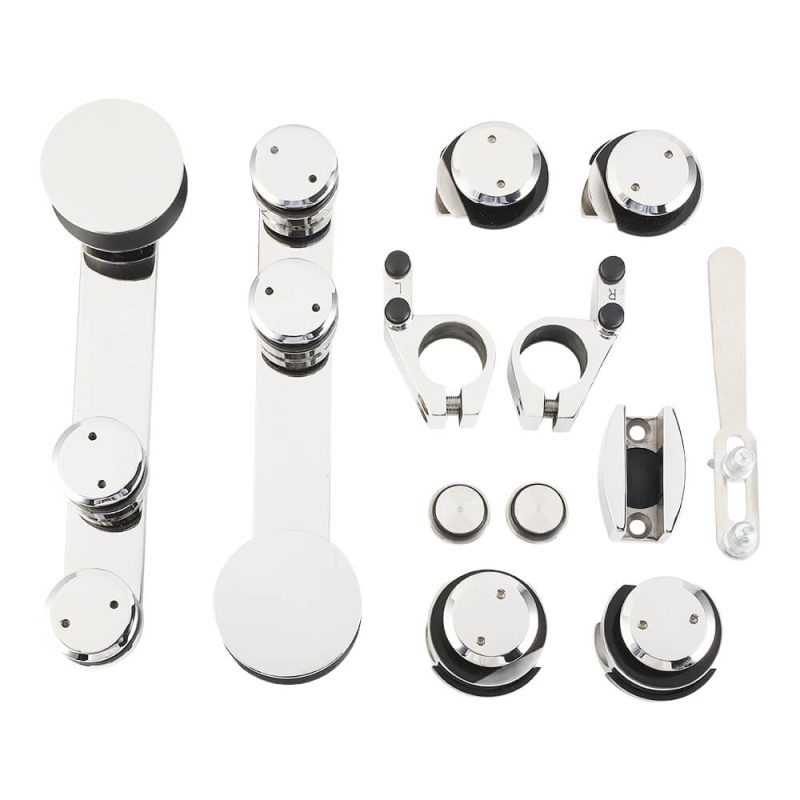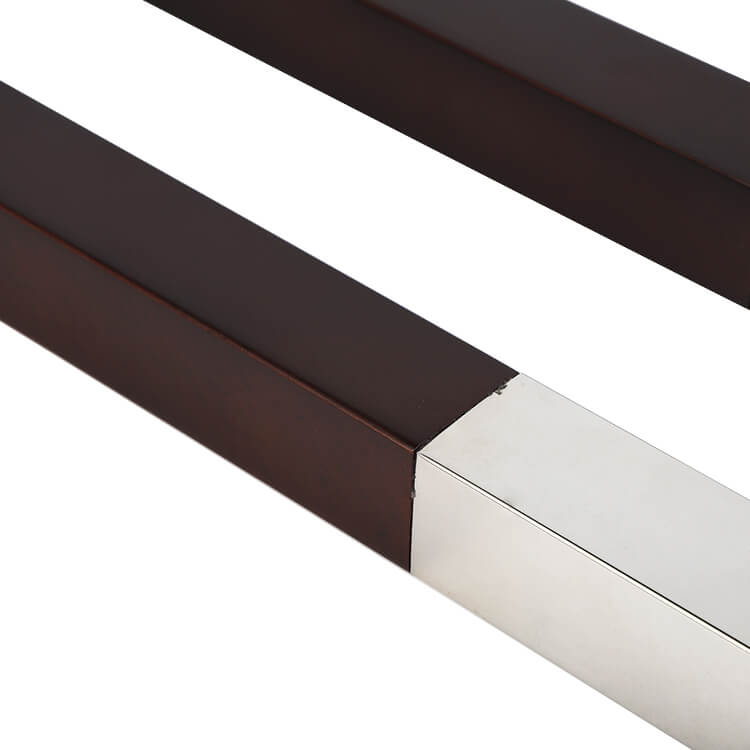What to Consider When Choosing Commercial Glass Door Hardware?
Selecting the right hardware for commercial glass doors is a critical decision that goes far beyond mere aesthetics. The hardware you choose impacts the door’s security, functionality, safety, and longevity. Making the wrong choice can lead to frequent repairs, security vulnerabilities, and even safety hazards. To ensure you make an informed decision, here are the key factors you must consider.

1. Door Type and Operation
The first step is to understand the type of door you are outfitting, as this dictates the hardware required.
Swing Doors: Require hinges (pivots or butt hinges), pulls, and a locking mechanism.
Sliding Doors: Need top-hung or bottom-rolling tracks, roller hangers, and pull handles.
Folding Doors: Utilize a specific track system and pivot hinges.
Revolving Doors: Demand a specialized and complex hardware set for safe operation.
The hardware must be specifically designed for the door’s operational style to ensure smooth function and avoid premature wear.
2. Material and Finish Quality
Commercial doors endure high traffic and constant use. The hardware must be built to last.
Material: Opt for heavy-duty materials like stainless steel (grade 304 or 316 for corrosive environments), brass, or bronze. These materials offer superior strength, corrosion resistance, and durability compared to lightweight, plated alternatives.
Finish: The finish should be not only visually appealing but also durable. Look for finishes like Physical Vapor Deposition (PVD) . PVD finishes are extremely hard, resistant to scratching, tarnishing, and fading, ensuring your doors look professional for years to come.
3. Security Requirements
The primary role of any door is to secure a premises. Assess the level of security needed.
Locks: Options include simple deadbolts, more advanced mortise locks, or electronic access control systems like keypads, card readers, or biometric scanners.
Glass Strength: Ensure the glass is tempered or laminated to resist impact. The hardware must be rated to work with the thickness and type of glass you are using.
Anti-Ligature Considerations: In healthcare or psychiatric facilities, hardware may need to be designed to prevent attachment points for ligatures.
4. Safety and Compliance
Safety is non-negotiable. Hardware must help prevent accidents and ensure compliance with local building codes.
ADA Compliance: In the U.S., hardware must meet Americans with Disabilities Act (ADA) standards. This means operable parts must be easy to grasp and use with one hand without tight grasping, pinching, or twisting of the wrist. Lever handles are often preferred over knobs.
Visibility: Glass doors must have markers or decals at the right height to meet building codes and prevent people from walking into the glass.
Safety Glass: As mentioned, using tempered or laminated glass is a fundamental safety requirement to prevent injury if breakage occurs.
5. Aesthetic and Design Cohesion
While function comes first, form is a close second. The hardware contributes significantly to the building’s aesthetic.
Style: Does the project call for a modern, minimalist look (often with sleek, stainless steel profiles) or a more traditional, classic appearance (with ornate brass finishes)?
Cohesion: The hardware should complement the overall design theme of the building’s interior and exterior, creating a cohesive and professional look.
6. Traffic and Frequency of Use
Consider the volume of traffic the door will experience.
High-Traffic Areas: Entrances to shopping malls, airports, hospitals, and office buildings require hardware rated for heavy-duty or commercial-grade use . These products are tested for millions of cycles.
Low-Traffic Areas: A back office or infrequently used room may suffice with a lighter duty product, but commercial-grade is always recommended for longevity.
7. Brand Reputation and Warranty
Not all hardware is created equal. Invest in reputable brands known for quality manufacturing and reliability.
Warranty: A strong warranty is a good indicator of the manufacturer’s confidence in their product. Look for warranties that cover finishes and mechanical functionality for an extended period.
Availability of Parts: Choose a brand with good distribution to ensure you can easily find replacement parts if needed in the future.
Conclusion
Choosing commercial glass door hardware is a multifaceted process that balances technical requirements with design goals. By carefully considering the door type, material quality, security needs, safety codes, aesthetic design, and traffic levels, you can select a hardware system that ensures smooth operation, enhances security, and maintains its beauty under the demands of daily commercial use. Always consult with a professional door hardware consultant or architect to ensure your selections meet all necessary specifications and codes.
-
What Are Shower Glass Hinges and Why Do Manufacturers Focus on Quality Standards?
11-02-2026 -
What Is the Best Material for Shower Door Hinges: Stainless Steel or Brass?
05-02-2026 -
What Types of Glass Office Door Locks Are Most Durable?
04-02-2026 -
The Advantages of Stainless Steel Glass Door Locks: Durability, Security, and Design
23-01-2026 -
Top Features of D Locks for Glass Doors: What to Look For
20-01-2026
-
Wall to Glass Hinge vs Glass to Glass Hinge: Which Is Better?
12-02-2026 -
Which Types of Shower Hinges Are Best for Modern Bathrooms?
10-02-2026 -
What Are the Different Types of Glass Shower Door Hinges?
06-02-2026 -
The Best Lock Options for Double Swing Glass Doors: Features and Benefits
31-01-2026 -
The Ultimate Guide to Glass Door Locks: Which One Is Right for You?
30-01-2026










